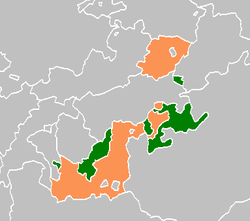
Back إمارة رويس Arabic Дом Ройс Bulgarian Reuss (Casa i Estat) Catalan Reussové Czech Haus Reuß German Reuß Esperanto Condado Imperial de Reuss Spanish Reuss Estonian Maison Reuss French Reuss (principato) Italian
Imperial County of Reuss Reichsgrafschaft Reuß (German) | |||||||||||
|---|---|---|---|---|---|---|---|---|---|---|---|
| c. 1010–1778/1806 | |||||||||||
 Reuss in 1820: Elder (green) and Younger (orange) line | |||||||||||
| Status | County | ||||||||||
| Capital | Weida until 1531, then Plauen, Gera and Greiz | ||||||||||
| Government | Principality | ||||||||||
| Historical era | Middle Ages | ||||||||||
• Established | c. 1010 | ||||||||||
| c. 1206 | |||||||||||
• Partitioned into Elder, Middle and Younger line | 1564 | ||||||||||
| 1778 | |||||||||||
| 1806 | |||||||||||
| |||||||||||
Reuss (German: Reuß [ˈʁɔʏs] ⓘ) was the name of several historical states located in present-day Thuringia, Germany. Several lordships of the Holy Roman Empire which arose after 1300 and became Imperial Counties from 1673 and Imperial Principalities in the late 18th century were ruled by the House of Reuss.
A varying number of these counties came into being by partition; they were partially merged and divided again. After the end of the empire in 1806, the principality of the elder line, as well as several of the younger, became sovereign member states of the German Confederation, with the younger ones merging into a unified principality by 1848. The two remaining territories became federal principalities of the German Empire in 1871, the Principality of Reuss Elder Line with the state capital of Greiz and the Principality of Reuss Younger Line with the state capital of Gera. Both states were ruled by the House of Reuss until the German Revolution of 1918–1919. The head of each branch bore the German title Fürst (Prince, as head of a princely house) while their children and all other members of the house bore the title Prinz/Prinzessin (Prince/Princess, as agnate members of a princely house).
Since the end of the 12th century, all male members of the House of Reuss are named Heinrich (English: Henry), in honour of Henry VI, Holy Roman Emperor (1190–1197), to whom they owed the dominions of Weida and Gera. For the purpose of differentiation, they are given order numbers according to certain systems (see below, section Numbering of the Heinrichs), and in private life they are distinguished by nicknames.

